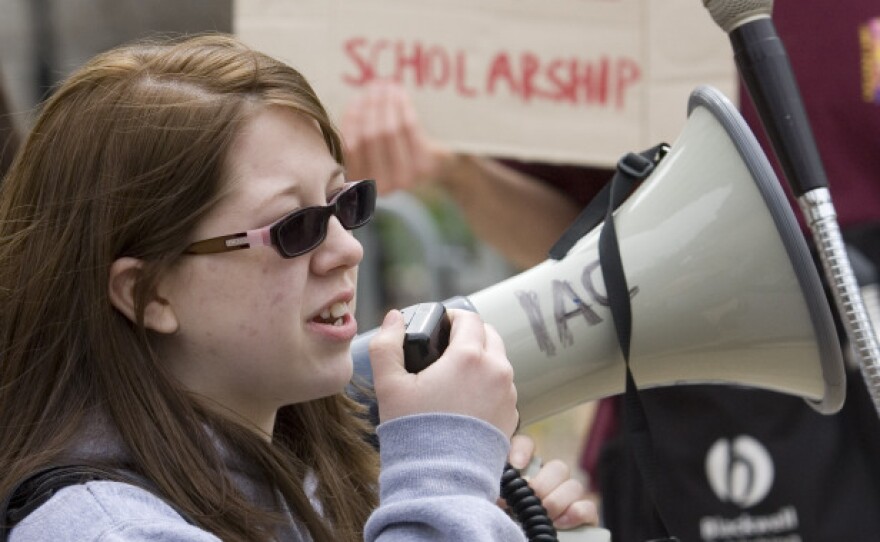Alonzo Mendez is the first person in his family to go to college. He's a 19-year-old student at Atlanta's Georgia Perimeter College and he's just one of many Georgia students who benefit from the state's HOPE scholarship, a program that uses lottery funds to pay college tuition for students who maintain a B average.
This year, state budget shortfalls and a drop in lottery revenue have led to cuts in HOPE scholarship funding. That means most students will no longer qualify for full scholarships, leaving many to wonder how they'll raise the cash to cover the extra costs.
Each semester, Alonzo Mendez receives about $1,500 from HOPE to cover his tuition costs — and he says he really needs the help.
"There was always that struggle of who can I rely on, what can I do, how can I get there?" Mendez says. "So now I'm just trying to do what I can."
That includes working part time while worrying about keeping his grades good enough to qualify for the full scholarship.
"It's insane 'cause I'm pulling out my hair with what I have already," Mendez says.
With the new cuts, those who maintain at least a B average will still get a partial scholarship, but that amount will vary depending on the cost of tuition and how much revenue the lottery brings in. The Legislature also set up a pool of money — at least $10 million — for low-interest student loans. And under the new rules, high school graduates must have a 3.7 GPA and a score of at least 1200 on their SATs.
The changes are expected to save $300 million, but some question tying the scholarship to SAT scores.
"Hard work can get you a higher GPA. Hard work will not always get you to a higher SAT score," Georgia State Rep. Stacey Evans told her colleagues on the House floor.
Evans grew up in rural north Georgia. She graduated from high school with a 3.8 GPA, but she didn't get a 1200 on her SAT.
"I could not make up for the fact that I didn't have 18 years at a dinner table with educated parents sharing vocabulary, talking about reading, giving me the tools I would need to score high on an SAT," she said. "That did not make me not the best and brightest in this state."
Evans is among those who wanted to give the scholarship an income cap so that families earning $140,000 or more wouldn't qualify. But that proposal failed to pass.
Georgia Rep. Doug Collins says the program was always intended to be merit-based and most lawmakers didn't want that to change.

"There was some criticism saying, 'Well you're hurting low-income students,' " Collins says. "In reality, if they read the bill ... that's not truly a valid argument."
Collins acknowledges that for some students it may be a struggle to find the funding to cover the rest of their costs, but he says the program had to be changed to remain solvent.
"If you look at it at the end of the day, Georgia still leads the way in providing hope — educational hope — for those wanting to go to post-secondary education," he says.
Others have long questioned whether Georgia's HOPE scholarship — and honor scholarships in other states — work at all. That is, whether they get students to attend college who otherwise would not go.
Donald Heller, director of the Center for the Study of Higher Education at Penn State, says he's worried about what the new cuts will do for students' chances at an education. "My concerns are that they're taking a program that was already not well-structured in terms of equity considerations, and they're going to make it even worse now," Heller says. "They're going to make it even harder for students who really need financial support to be able to afford college, to be able to qualify for the highest level of scholarship."
Georgia's new Republican Gov. Nathan Deal says there was no choice but to make cuts. The state had already dipped into its lottery reserves this year to keep the program going, so he says the decision was either to reduce HOPE or lose it altogether.
Back at Georgia Perimeter College, Cynthia Tatis reads the newspaper between classes. She's a foreign language major who says that under the new rules, she'll no longer qualify for HOPE assistance. Tatis works part time and gets some grants, but she's not sure how she'll get the money to cover books, fees and the extra cost of tuition.
"This summer I think I'm going to apply for a second job, hopefully raise enough money and save enough money to be able to afford at least a semester or two. You know my dad is actually out of a job right now, so it's really hard financially — but I'm still here," Tatis says. "I'm struggling, but I'm still here."
Copyright 2022 NPR. To see more, visit https://www.npr.org. 9(MDAzMjM2NDYzMDEyMzc1Njk5NjAxNzY3OQ001))







